Inspired. Moved. Connected. Energized.
These were some of the words chosen by our Fellows and partner lawyers when asked to convey in one word how they felt about their experience at our first ever Bertha Justice Initiative global convening in March 2014. That was exactly what we had been aiming for. Looking back on this convening one year on, it was without a doubt a significant moment for the Bertha Justice Initiative.
The Bertha Justice Initiative helps Bertha Fellows to connect with each other – and with the vibrant network of the dynamic lawyers we support – through educational exchanges and a bi-annual global convening which brings everyone on the program together.
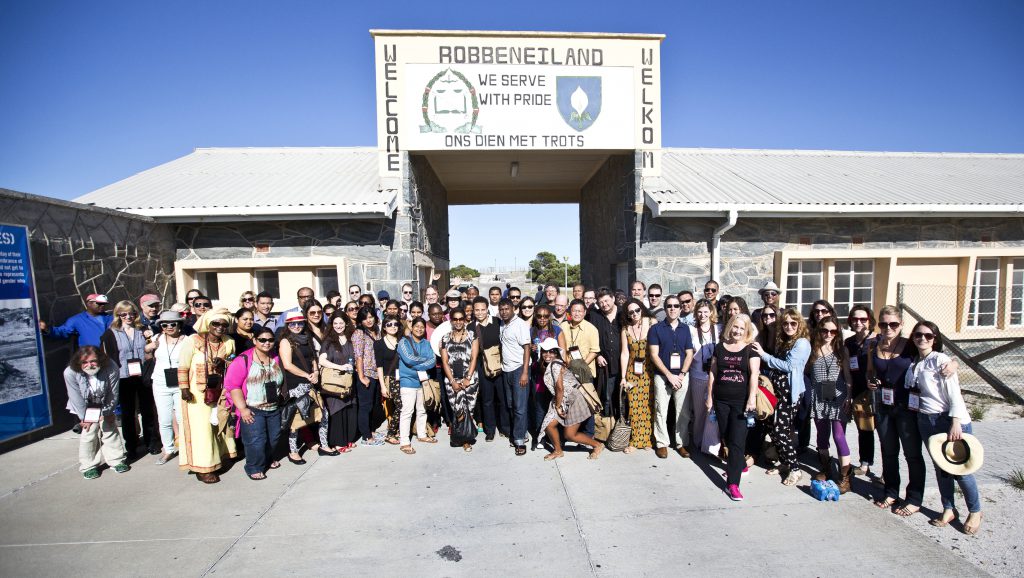
As the site of our first global convening, Cape Town – and South Africa’s rich cultural and political history and transition to democracy – provided the background for a week of plenary talks and panel discussions, skills workshops, site visits and sight-seeing. South Africa is an interesting place for movement lawyers to learn and reflect on their struggles at home: movement lawyers played a key role in the struggle to end apartheid in the country, and later helped draft the Constitution and serve on the Constitutional Court to interpret and enforce those newly codified rights in the new democratic state. Their experience serves as an important reminder of what is possible for those who continue to struggle against seemingly intractable injustices the world over. Today, the next generation of South African lawyers play a key role in working with social movements and affected communities, and litigating to enforce those constitutional rights for the benefit of South Africa’s poor and disadvantaged, many of whom have not yet seen the changes promised by successive democratically elected governments.
More than 100 lawyers and Bertha Fellows from the Bertha network went to Cape Town, including lawyers from Colombia, the US, Philippines, Germany, Thailand, Peru, Pakistan, India, Mexico and from around South Africa. Unfortunately, Bertha Fellows from Palestine and Haiti were unable to attend due to travel restrictions. Our Palestinian Fellows could not leave Gaza because they are not permitted to leave through Israel and the border was closed at Rafah. Our Haitian Fellows were denied visas by the South African government. Their absence highlighted the injustices faced by people in these and many other places, emphasizing again the importance of the work of Bertha’s partner organizations.
Prominent legal and activist figures came to share their experience and knowledge, which encouraged and inspired our Bertha Fellows about their future in this work. As one of our South African Fellows explained, the convening provided “the extremely rare opportunity to speak to some of my legal heroes and the best lawyers globally [and] learn from their experiences.”
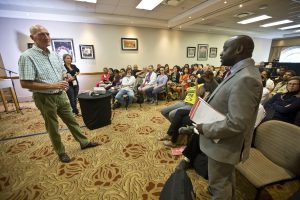
We heard from Justice Edward Cameron, who spoke of his personal journey from being a human rights lawyer during apartheid with our Bertha partner organization the Centre for Applied Legal Studies to becoming a Constitutional Court judge. Justice Cameron also shared with Fellows his experience as a gay and HIV positive man, and emphasized the power of the law as a tool for social justice.
Albie Sachs spoke of his anti-apartheid activism as a lawyer and how he survived an assassination attempt while in exile in Mozambique before returning to South Africa to draft the nation’s new Constitution. He explained vividly how, as the first ever President of South Africa’s new Constitutional Court, he saw how the law could be used to improve conditions for those most in need. Sachs told the Fellows how his court came to decide the Grootbroom decision, which is now cited around the world as the seminal case on housing rights and on the interpretation and enforcement of economic, social and cultural rights.
Internationally renowned activist Zackie Achmat shared his experience as a political activist and founder of some of South Africa’s most important social movements – from the Treatment Action Campaign to Equal Education and the Social Justice Coalition – and reinforced the need for movement lawyers to amplify the voices of activists and social movements.
Fellows also heard from some of the inspiring partner lawyers within our network. Katie Redford, co-founder of EarthRights International, spoke about suing US-based multinational corporations for human rights abuse abroad under the Alien Tort Claim Act. Using case theory she developed as a law student, in defiance of her former professor (who gave her an A for the research paper but told her it would never work in practice), she committed herself to achieving justice for the abuses she witnessed in Burma – and won. She proved her professor wrong and later argued in cases in the Supreme Court against him. Her point to the Fellows was this: young lawyers should be bold and creative in seeking solutions to human rights problems because, as she explains in the video, “the Fellows are going to have the next great idea – they can teach us also, they can be the ones to come up with new ideas [and] innovative ways to change the world.”
Margaret Stride, a Fellow with the Legal Resources Centre, said she found Katie’s message to be “inspirational”. Reflecting on the convening more broadly, Margaret said she particularly enjoyed the experience because
the whole convening broke with the usual structure where the young lawyers learn from those who have been doing this work for many years; while we were lucky enough to be taught by amazing people who are extremely authoritative on various issues, the general atmosphere was one of collaboration and everyone’s ideas and experiences were valued.
Vince Warren from the Center for Constitutional Rights spoke of how, like the Fellows at the convening, he was inspired by South Africa’s struggle for racial equality in the early stages of his own career. He urged Fellows to remember that, while this work can be difficult and overwhelming, “you must believe that justice is possible.”
Fellows also participated in seminars to learn more about the work of Bertha partner organizations. They engaged in comparative discussions about casework on business and human rights, torture and state violence, and international criminal justice. Our partner lawyers and grantees such as Right to Know, Equal Education, Social Justice Coalition, Amabhungane: the Mail and Guardian’s Investigative Centre and the New Media Advocacy Project provided skills sessions on media engagement, video advocacy, tech training, client and witness interviews and constructing case theories.
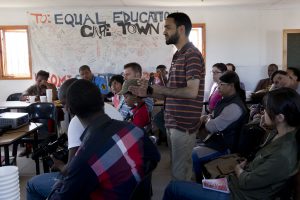
Fellows went on site visits to learn first-hand about the work of our Bertha partner organizations in and around Cape Town. Fellows were able to visit schools in Khayelitsha with Equal Education and to hear from Equal Education Law Centre about their legal support work aimed at achieving equality in education. They also were able to visit Bardale and Joe Slovo to meet with the communities that the LRC has been working with to help to secure their right to housing under the Constitution.
The incredible Ahmed Kathrada led a tour of Robben Island, where Kathrada spent 26 years in prison alongside Nelson Mandela. The entire group was incredibly moved hearing first-hand about their experience inside the prison and Kathrada’s reflections on South Africa’s struggles – past and present. It was particularly special for our South African Fellows, who also spoke with Kathrada over lunch. As one of our fellows said, “to be able to have a conversation or a minute of Mr Kathrada’s time is something that no one can ever take away from us…to simply listen to him speak about what drives and motivates him is extremely moving.”
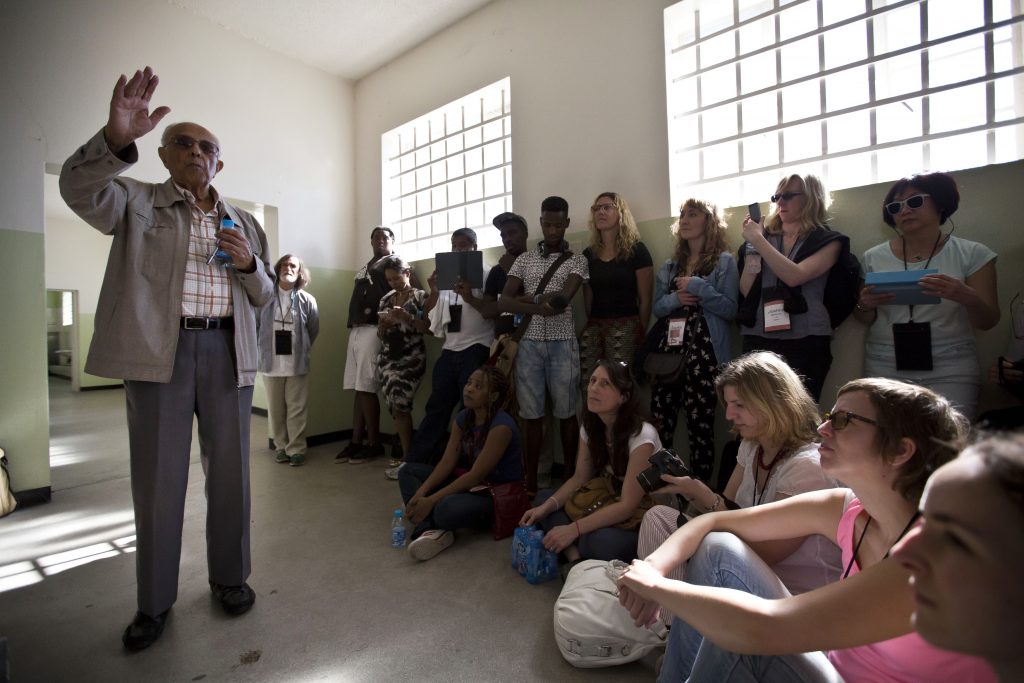
Throughout the convening, Bertha hosted a series of documentary film-screenings in collaboration with the Encounters Documentary Film Festival, which were also open to the public. We hosted the world premiere of the award-winning documentary Miners Shot Down and a panel discussion with lawyers from LRC, SERI and CALS – all Bertha partners – who are representing victims and their families at the Marikana Commission.
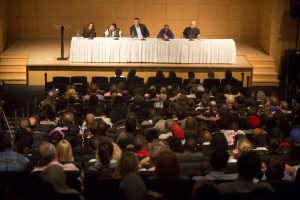
Our South African Fellows, in particular, spoke of how important it was for them to see this film and to share this experience with their international colleagues. As one Fellow explained, it “helped people understand the challenges we face in South Africa and the very complex and sometimes contradictory setting we operate in as human rights lawyers.”
A screening of Granito: How to Nail a Dictator, which documents the use of film to bring Rios Montt to justice for the Guatemalan genocide, was followed by discussions with filmmakers Pamela Yates and Paco de Onís, and Bertha partner lawyers, Reed Brody and Jacqueline Moudeina, who are prosecuting Hissen Habré for crimes against humanity in Chad.
Bertha partners in Chad, Haiti, Palestine, Philippines, Colombia and Germany are working on International Criminal Court (ICC) and universal jurisdiction cases to seek justice for victims of international crimes and rich comparative and strategic discussions resulted.
Aside from film screenings, there were many opportunities for fun – including a performance by Freshlyground, a hugely popular South African band. Most famous for performing Waka Waka with Shakira for the World Cup, Freshlyground has a large pan-African following and is known for the political message of their music – once being banned from Zimbabwe by Robert Mugabe for a song portraying him as a chicken scared of relinquishing power.
In the run up to this convening – the first of its kind for Bertha – we hoped that bringing our Fellows together would help to build solidarity across borders, to foster a sense of community among lawyers doing this difficult work and to create opportunities for comparative learning and collaboration. We now know from experience we were successful in achieving these goals. All the feedback from our Fellows and partners demonstrates just how instructive and productive/worthwhile the convening was and how much it has informed their work over the last year.
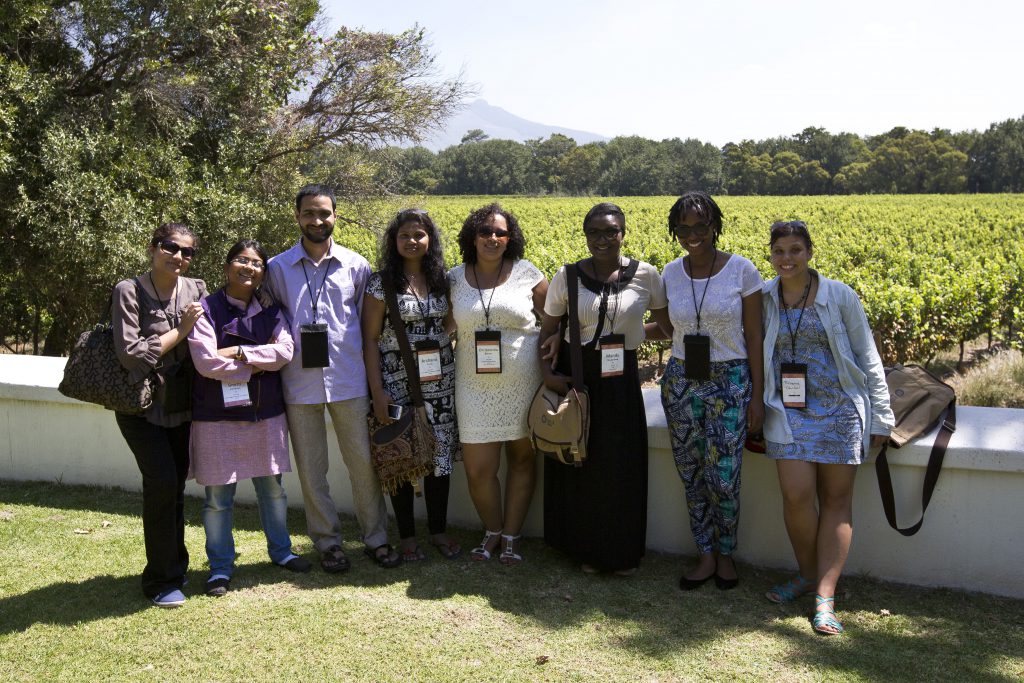
Chauniqua Young, a Fellow from the Center for Constitutional Rights, articulated well the question we wanted everyone to consider: “we are all here from different countries, we are working on an issue…how can we use the Bertha network? How can we use each other as resources?”
The convening laid the groundwork for productive, innovative, and global collaborations. Legal strategies were shared. New cross-jurisdictional partnerships were created and joint cases were planned. Shahzad Akbar, founder and executive director of the Foundation for Fundamental Rights in Pakistan, said “we found so many similarities and also common ground where we can help each other.”
Fellows and partner lawyers alike left feeling inspired and energized about their work at home. As Chriscentia Blouws explained:
“Meeting all my fellow Bertha Fellows and partner organizations was an inspiring experience. Leaving the convening at the end of the week I felt extremely motivated to do better in my work and inspired me to share experiences and build relationships and lasting friendships with my Fellows across the globe.”
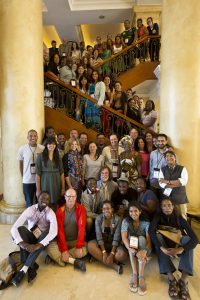
Connections – and lasting friendships – were made. A real sense of community and solidarity developed, which we hope will help sustain the Fellows in their future careers. “[The Convening] opened my mind to a community of social justice activists from around the world,” said one Fellow. Another reported that the experience provided “a rewarding feeling to know that I am part of a bigger global network that is aimed at effecting social justice and protecting people’s human rights.”
Importantly, many Fellows reported that the convening confirmed and entrenched their commitment to continue this work – and to be more brave and bold in doing so. “I feel more confident to break the mold, to try something new,” one Fellow explained.
For Mabatho Molokomme, the “Bertha Be Just Global Convening, was a highlight of my year. This was an amazing initiative bringing radical minds together for one common cause.” For Margaret Stride, “The convening was one of the best experiences I have ever had, both professionally and from a personal point of view.”
We were thrilled with the 2014 global convening and are hoping to make 2016 even bigger and better.
Watch this short video about our 2014 convening:
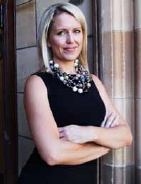
Jennifer Robinson
Director of Legal Advocacy
Follow Bertha Justice Initiative on Twitter @Be_Just_
Follow Jen Robinson on Twitter @suigenerisjen
Article Tags: Bertha Fellows / Bertha Justice Initiative / human rights lawyers / movement lawyering / South Africa